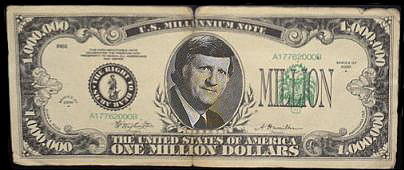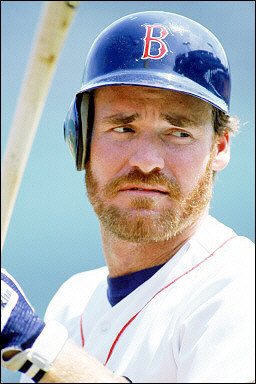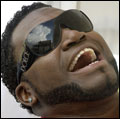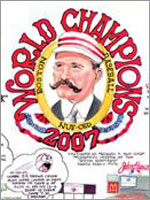Car Dealer’s Choice
|

|
|
(Boston Dirt Dogs Photo / Jason Dalrymple) |
Headline: Commissioner Bud Selig Approves Johnson Trade.
Ever since Commissioner-for-life (CFL) Bud Selig approved the New York Yankees trade of Javier Vazquez and megabucks for Randy Johnson, I’ve been troubled. Troubled by what future imbalance of power or misrepresentation could cause el jefe to reject a trade. Recall, of course, that in 1976, Commissioner Bowie Kuhn voided the Red Sox purchase of Joe Rudi and Rollie Fingers from the A’s, delaying the Red Sox inevitable ascension to World Champions.
How appropriate that baseball’s CFL began his career as a humble multimillionaire car dealer, allowing him to join baseball’s ownership club as purchaser of the Seattle Pilots for $10.8 million. In baseball, he didn’t have to worry about Lemons (Bob or Chet) just about winning baseball. Of course, when he became Commissioner, his ownership was placed in trust. Forbes estimated the Bud Selig Trust ownership franchise Milwaukee Brewers franchise value at $238 million dollars, just above the Yankee annual payroll.
To quote from the Selig biography at www.baseball-almanac.com. “As the owner of a small-market team, Selig obviously understands the difficulties that the “Milwaukees” of the world have going up against financially superior teams like the New York Yankees. This issue will continue to plague Major League Baseball and along with the debate over mandatory drug testing, has turned the spotlight on Bud to fix the problem at all costs. Over the last few years, many fans and media have doubted Selig's abilities refusing to recognize that any of his policies have had a noticeable impact on fixing today's “broken game”.
What constitutes grounds for approbation of a baseball trade? Follow the money. Selig obviously sees a redistribution of MLB wealth as the principal benefit. As baseball’s Robin Hood, he takes from the rich, George Steinbrenner, and gives to the ‘poor’, Arizona. Does Troy Glaus have incriminating pictures? The Yankees will fork over additional dollars in luxury tax for the privilege of owning the forty-something Big Unit. Another win for baseball’s ‘small market’. We are talking a virtual rise of the proletariat.
What could keep Selig from approving a trade? At Boston Dirt Dogs, we have solicited opinions from around the globe in search of the truth.
Unnamed source from the Dalai Lama’s staff: “We can live without religion and meditation, but we cannot survive without human affection. An unkind word from New York could turn our cheek.”
From the Wachowski brothers, writers of The Matrix: “you know the scene where the agents make Neo’s mouth disappear. Something like that, you know, where the Commish couldn’t speak. Freaky, man.”
From the Federal government: “duct tape and plastic. Enough duct tape and plastic and you can stop anything.”
From Hannibal Lecter in Silence of the Lambs: “I ate his liver with some fava beans and a nice chianti.”
From Reverend Jerry Falwell, “The ACLU’s got to take a lot of blame for this.”
From Bill Clinton: “There is nothing wrong with America that cannot be cured for what is right with America.”
Of course, more likely causes for Bud’s rejection of a Yankee trade would be the Solar System disappearing in a black hole, the earth being hit by a giant asteroid, or Selig attending a marathon session of the NHL’s new videos, “highlights from the 2004-2005 hockey season.”
Some say the Yankees are unbeatable with Johnson and their quarter million dollar infield. I think Albert Einstein’s view of next season is good enough. “I never think of the future, it comes soon enough.” Whatever happens, be sure that Selig will be wearing his pinstripe suit.
-- Ron Sen, Boston Dirt Dogs
Boggs Style Wasn't in Fashion
|

|
|
(AFP Photo) |
Wade Rips 'Selfish' Tag
1.5.05: Hall of Famer Wade Boggs on WEEI’s The Big Show:
Steve Buckley: When you played for the Red Sox, your critics, and I believe you know who they are and were (WB: Haa, you mean “the geniuses?”), exactly the geniuses would say about Wade Boggs, all he cares about is getting on base, now in 2004 (WB: It’s fashionable) It’s fashionable, exactly. The GMs are going out and beating the bushes looking for Wade Boggs…
WB: And guys that can do that are making $8-9-10 million a year too… (SB: Are you amused by that?) I think it’s funny, it was something that I was good at. I was sort of a pioneer along those terms. And back then it wasn’t fashionable to get on base 300 times. It wasn’t fashionable to get 200 hits and 100 walks. And nowadays when guys do it, it’s unbelievable. And getting on base and having an on-base percentage of .450, .460, .470, umm I’m still trying to figure out what’s selfish about that… somebody’s gotta get on in front of Big Jim Rice to hit that three-run homer.
Steve Burton: Do you believe Jim Rice should be a Hall of Famer?
WB: Absolutely. Absolutely I’ve been talking about Jim for two days now and I’m one of his biggest backers. He’s got proven numbers, .298 with 1,400 RBIs over 350 home runs, over 2,400 hits. When you look at his stats and the amount of time that he did it in, I believe it’s 16 years, without a doubt he’s a Hall of Famer.
Glenn Ordway: I wonder what you’re feeling was watching the Red Sox win something that you tried to help with and that you know how important it was for this community. What was your reaction?
WB: “I loved it. We were just pulling for the Red Sox, and we were just going nuts. And I still have a lot of close friends that are elderly in the New England area and they were begging the Red Sox to win a World Series before they went up to that big Fenway Park in the sky so I was so happy for the New England area and the Boston Red Sox organization that I felt a part of it. And to listen to Curt Schilling say that this one was for the guys that came before us, the Wade Boggs and this and this. That was so special, he didn’t have to say that. And to sit there and to finally see something that took so long to occur, and two months ago I was in Boston for the (Red Sox) Hall of Fame dinner… just walking down the street looking at individuals with their head held high and their chest poked out, there’s a different swagger about Bostonians right now that they’re on top and I’m telling you it just brought back that old-timey rival of the Yankees-Red Sox rivalry and it’s so great for baseball and I was so proud for New England.
GO: When you first came up you were not a great fielder, but you worked at it to the point where you won a couple of gold gloves and I wonder how difficult that was…
WB: Johnny Pesky. That’s plain and simple. Johnny Pesky is the reason that I won those gold gloves. He got all those blisters all those years at 3:07 asking Johnny ‘hey, let’s go’ and that was another one of the superstitions, had to take ground balls at 3:07. And Johnny would hit the ground balls. That was the one label that I wanted to knock, to get off my back, was “all hit and no glove.” And eventually did that. And every player who plays this game wants to be known as a complete plalyer. And in ’94, when I won the gold glove, it solidified that so that was a very proud moment.
Steve Burton: Let me ask you this, 3,010 hits, 75% of your hits were singles, are you aware of that? People would get upset at you because they were thinking “oh man, he’s just hittin’ for himself, he’s a selfish player, he’s just hitting, and I remember when you hit the home run in the All-Star game, why doesn’t he hit like that all the time?’
Wade Boggs: That was a fluke. The home run in the All Star game was a fluke, just like my 3,000th hit was a home run and it was a fluke. See there’s one thing that I knew that I could do good and that’s hit a line drive. I worked from left and to right center and through the biggest part of the field. I knew if I hit long fly balls I was out. I didn’t have these big giant muscles that these guys have nowadays to hit the ball out of the ballpark (SB: You mean steroids?)… I could hit a line drive and I hit by recognition. I hit by looking for the little dot on the baseball, looking for the little tumble on the fork ball. So it was a situation that, when you hit that style, you’re not out in front of balls and grounding out to second base and you’re not popping up balls to the shortstop (a.k.a. “Garciapopup™”) and flying out weakly to the outfield with a man on third and ending rallies with a wild strike out with a fork ball in the dirt or something like that. No, I got 200 hits and 100 walks each and every year, and on base .450 and scored over 100 runs, that was my contribution, that was how I felt like I was contributing to the team and not going up there and hitting .220 with 20 home runs and striking out 190 times and saying “boy I had a great year.”
Was Boggs One of Boston's Best?
Sports Illustrated: Every Team Needs a Bruschi
Make that Tedy Bruschi, and New England has the only one. The big-play linebacker and unsung leader of the defense gives the Pats a shot at their third title in four years.
By Josh Elliott, Sports Illustrated
He is outnumbered again, staring down a menacing double team. If it’s fair to say a man’s work is never done, then right here—at the backdoor to his house, after several hours of trading blows and barbs with his New England Patriots teammates—Tedy Bruschi’s long day isn’t over yet. When the two young boys lunge at him, chirping with delight, Bruschi sees himself in their tiny faces and hears his own father’s words: Get the ball, Tedy. Go get the ball. Those words, which were sometimes said in derision, have motivated Bruschi since he was a child.
The Bruschi boys set upon their dad again and jog him from his reverie, throwing themselves at him over and over. Later, as he is recounting this scene, Bruschi couldn’t be happier. “My boys are just like me: really physical,” Bruschi says of Tedy Jr., 4, and Rex, 2. “Every day it’s a big tackle-athon. I love it. They never quit. They play just like their dad—and just like their dad’s team.”
While the Pittsburgh Steelers (15–1) are the AFC’s nouveau power and the Philadelphia Eagles (13–3) are the class of the NFC, the NFL playoffs remain the domain of the defending champion New England Patriots (14–2). Winners of 29 of their last 31 games (including the postseason), the Pats have a first-round bye before beginning their quest for a third Super Bowl win in four seasons with a divisional-round game on the weekend of Jan. 15–16. New England is the league’s model franchise because each player, no matter his position or cap figure, embraces coach Bill Belichick’s team-first philosophy. “I know one thing,” says Bruschi, 31, a New England linebacker for nine years. “I was meant to play with these 52 guys, for this coach, in this system.”
Indeed, Bruschi seems the picture-perfect Patriot. Hard-nosed and a vocal leader, Bruschi (pronounced BREW-ski, to the joy of beer-swilling, pigskin-loving New Englanders) is admired for his toughness and loyalty to an organization that risked a third-round draft choice on him in 1996, when he was an undersized defensive end out of Arizona. And long before Pats defensive tackles lined up as fullbacks and wideout Troy Brown intercepted three passes as a part-time cornerback, Bruschi’s versatility was celebrated. Too small, at 6'1" and 245 pounds, to play end in the NFL, he learned three linebacker positions in two schemes under three coaches. Though unheralded in a conference that features the Baltimore Ravens’ Ray Lewis and the Miami Dolphins’ Zach Thomas, he has become an All-Pro–caliber inside linebacker and routinely makes game-breaking plays.
But to understand a player so humble that he wonders aloud who would ever read an article about him, ask Bruschi what he considers to be his most important contribution each week. “Punt team,” he says, not missing a beat. “The punt’s the most important play in a game. So many things can happen: a turnover, a score, a big change in field position. My college coach, Dick Tomey, told me he didn’t care who I was—he needed me on punt team. So I covered punts, and still do. I love covering punts.”
Says New England linebacker Mike Vrabel, “Everybody needs a Tedy Bruschi, but good luck finding one. It’s impossible to put value on everything the guy does. When he walks into a meeting or a huddle, he brings instant credibility. He’s been productive for so long, even though he’s had to switch positions. He’s everything for this team.”
This year Bruschi finished with 122 tackles, second best on the team, and 31¼2 sacks for the NFL’s ninth-ranked defense. But for all his fundamental strengths, it’s his knack for making the big play that sets him apart. “Their defense isn’t the same without him,” says New York Jets center Kevin Mawae. “He plays 100 miles an hour. He makes plays that are unbelievable.” ...read the rest in this week's Sports Illustrated
















